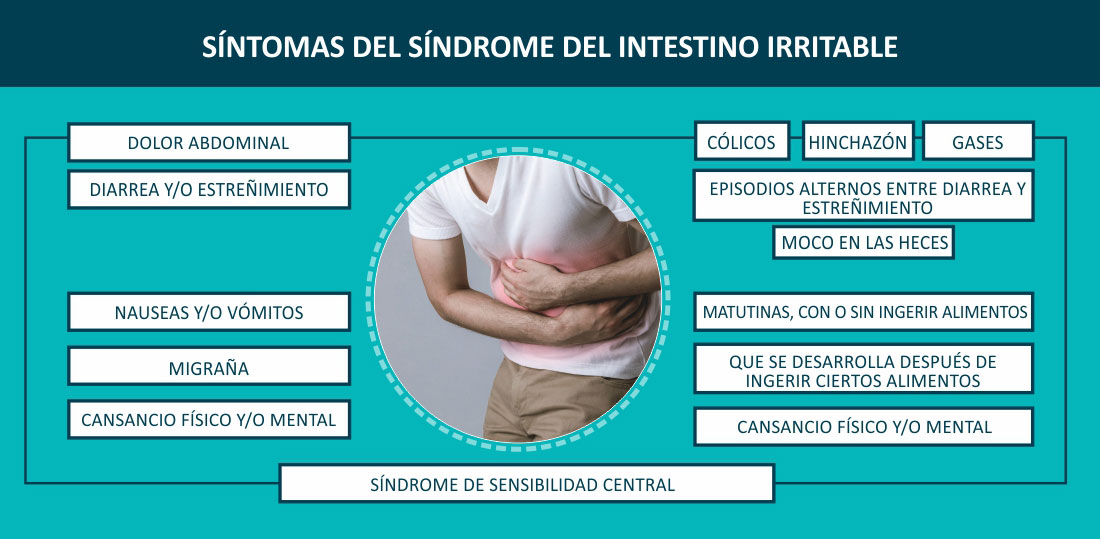SÍNDROME INTESTINO IRRITABLE
El síndrome de intestino irritable (SII) es un trastorno que afecta al intestino, las personas que padecen de SII frecuentemente sufren de dolor abdominal, cólicos, gases, hinchazón, pesadez estomacal, diarrea y/o estreñimiento, calambres en el abdomen. El SII está asociado al Síndrome de Sensibilidad Central, puesto que en ambos hay una disfunción inmunoneuroendocrina, se cree que en el SII existen alteraciones en los nervios del aparato digestivo que pueden provocar la cronificación de dolor, al existir un comunicación inadecuada entre el cerebro y el intestino, las señales que se transmiten tanto del cerebro al intestino como del intestino al cerebro están mal coordinadas, por lo que es normal que la respuesta del cuerpo sea exagerada y se mantenga en el tiempo (dolor, gases, diarreas, estreñimiento).
Cuando se trata del SII es importante relacionarlo con la permeabilidad intestinal, ya que, si existe una alteración en las células epiteliales de la barrera intestinal, pueden pasar al torrente sanguíneo agentes patógenos, toxinas, etc., que pueden producir una alteración en las respuestas inmunológicas del organismo, y en consecuencia activar y/o exacerbar la disfunción inmunoneuroendocrina.


ARTÍCULOS CIENTÍFICOS
Zhou, Q., Wesselmann, U., Walker, L., Lee, L., Zeltzer, L.,Verne, G. N. (2018). AAPT Diagnostic Criteria for Chronic Abdominal, Pelvic, and Urogenital Pain: Irritable Bowel Syndrome. The Journal of Pain, 19(3), 257-263.
Wu, M. F., Yang, Y. W., & Chen, Y. Y. (2017). The effect of anxiety and depression on the risk of irritable bowel syndrome in migraine patients. Journal of Clinical Neuroscience, 44, 342-345
Li, C., Yu, S., Li, H., Zhou, J., Liu, J., Tang, W., & Zhang, L. (2017). Clinical features and risk factors for irritable bowel syndrome in Migraine patients. Pakistan journal of medical sciences, 33(3), 720.
Yang, T. Y., Chen, C. S., Lin, C. L., Lin, W. M., Kuo, C. N., & Kao, C. H. (2017). Risk for irritable bowel syndrome in fibromyalgia patients: a National Database Study. Medicine, 96(14).
Wolfe, F. (2018). Fibromyalgia Syndrome and Fibromyalgia Syndrome Criteria: Problems in Definition and Validity. Fibromyalgia Syndrome and Widespread Pain: From Construction to Relevant Recognition.
Pinto-Sanchez, M. I., Hall, G. B., Ghajar, K., Nardelli, A., Bolino, C., Lau, J. T., Traynor, J. (2017). Probiotic Bifidobacterium longum NCC3001 reduces depression scores and alters brain activity: a pilot study in patients with irritable bowel syndrome. Gastroenterology, 153(2), 448-459.
Labus, J. S., Hollister, E. B., Jacobs, J., Kirbach, K., Oezguen, N., Gupta, A. Savidge, T. (2017). Differences in gut microbial composition correlate with regional brain volumes in irritable bowel syndrome. Microbiome, 5(1), 49.
Irvine, A. J., Chey, W. D., & Ford, A. C. (2017). Screening for celiac disease in irritable bowel syndrome: an updated systematic review and meta-analysis. The American journal of gastroenterology, 112(1), 65.
Wu, R. L., Vazquez-Roque, M. I., Carlson, P., Burton, D., Grover, M., Camilleri, M., Turner, J. R. (2017). Gluten-induced symptoms in diarrhea-predominant irritable bowel syndrome are associated with increased myosin light chain kinase activity and claudin-15 expression. Laboratory Investigation, 97(1), 14.
Barmeyer, C., Schumann, M., Meyer, T., Zielinski, C., Zuberbier, T., Siegmund, B, Ullrich, R. (2017). Long-term response to gluten-free diet as evidence for non-celiac wheat sensitivity in one third of patients with diarrhea-dominant and mixed-type irritable bowel syndrome. International journal of colorectal disease, 32(1), 29-39.
Wood, J. D. (2018). Neuropathophysiology of the irritable bowel syndrome. In Physiology of the Gastrointestinal Tract (Sixth Edition) (pp. 1643-1668).
Grassini, S., & Nordin, S. (2017). Comorbidity in migraine with functional somatic syndromes, psychiatric disorders and inflammatory diseases: a matter of central sensitization. Behavioral Medicine, 43(2), 91-99.
Knowles, S. R., Austin, D. W., Sivanesan, S., Tye-Din, J., Leung, C., Wilson, J., Hebbard, G. (2017). Relations between symptom severity, illness perceptions, visceral sensitivity, coping strategies and well-being in irritable bowel syndrome guided by the common sense model of illness. Psychology, health & medicine, 22(5), 524-534.
Labus, J. S., Hollister, E. B., Jacobs, J., Kirbach, K., Oezguen, N., Gupta, A., Savidge, T. (2017). Differences in gut microbial composition correlate with regional brain volumes in irritable bowel syndrome. Microbiome, 5(1), 49.
Tap, J., Derrien, M., Törnblom, H., Brazeilles, R., Cools-Portier, S., Doré, J., Simrén, M. (2017). Identification of an intestinal microbiota signature associated with severity of irritable bowel syndrome. Gastroenterology, 152(1), 111-123.
Pusceddu, M. M., Murray, K., & Gareau, M. G. (2018). Targeting the Microbiota, From Irritable Bowel Syndrome to Mood Disorders: Focus on Probiotics and Prebiotics. Current pathobiology reports, 6(1), 1-13.









